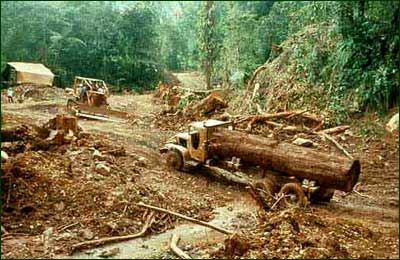- Home
- About Us
- Issues
- Countries
- Rapid Response Network
- Young Adults
- Get Involved
- Calendar
- Donate
- Blog
You are here
Extractive Industries
Illegal Logging

Illegal logging is the breaking of laws on cutting, processing, and transporting timber or wood products. Logging as an industry needs to be better regulated since it is a hazard to ancestral lands and the lives of indigenous communities.
Illegal logging is a threat to the environment and human rights because:
- Logging leads to soil erosion and dry water sources, which result in landslides and forest fires
- Money lost due to illegal logging is being misdirected from the people of Central America
- Logging gangs bring violence to indigenous communities
- read more
Mining
Mining is the process of extracting resources from the Earth. Mining is inevitably an environmentally destructive process with severe consequences for the inhabitants of the land. Several companies now mine in Central America and Colombia, neglecting environmental standards and the demands of the local people.
Mining is a threat to the environment and human rights through:
- Over-harvesting water. Mining uses substantial amounts of water in areas where water is already scarce, permanently destroying river sources and mountain steams
- Erosion. Erosion is often caused by dehydration of the land. It results in the killing of natural forests, destruction of local sustainable agriculture, and creation of dangerous sink holes
- Contamination of water and soil. Water floods abandoned mines reacting with metal sulfides leftover from the mining process, producing sulfuric acid that pollutes lakes, rivers and other water sources, also known as acid mine drainage. Surrounding areas become contaminated, harming crops, livestock, and human life
- Creating waste. Mining requires removing vast quantities of residual rocks and minerals
- Clear cutting of forests. Clear cutting of forests releases poisonous gases into the air, which causes acid rain and negative health effects
Oil Drilling & Exploration
The oil industry is one of the biggest businesses in the world. Because of its many uses, including the most common use as a fuel to sustain sources of transportation, oil remains a vital resource today; one we cannot do without. The high demand calls for an increase in the drilling and exploration of oil. As a result, South and Central American governments began drilling in remote areas, which often are home to indigenous peoples.
Oil drilling and exploration is a threat to the livelihood of indigenous peoples and the environment because:
- Sources of water and the soil, upon which the indigenous people are dependant, become polluted
- Guerilla groups frequently move to areas where oil companies’ drill, which causes an increase of violence in the region
- Protests for peaces are often met with violence, as leaders of movements become victims of political violence
- Indigenous peoples may be forcibly relocated, although they have lived in the region for innumerable years and the land upon which they live is an integral part of their culture
